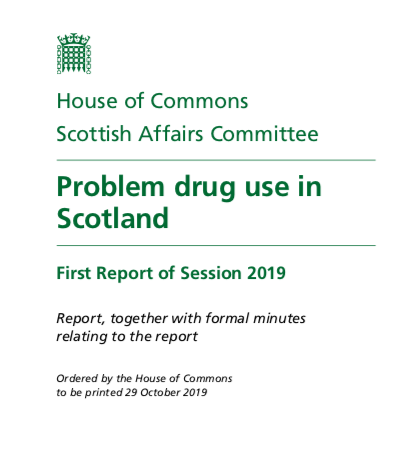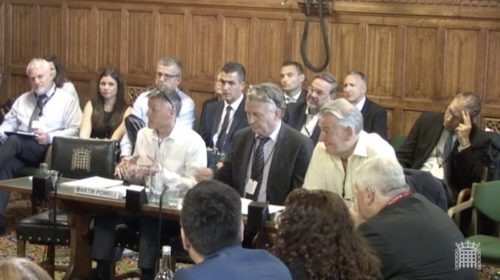4th November 2019
For the second time in as many weeks, a Parliamentary committee has called for a comprehensive rethink of national drug policy. Previously, the Health and Social Care Committee called for decriminalisation of possession, increased treatment funding and safer consumption facilities. Now, the Scottish Affairs Committee has made an impassioned plea for similar reforms as a response to the tragic increase in drug-related deaths in recent years.
The Scottish Affairs Committee report, pulls no punches, insisting that “the criminal justice approach to people with problem drug use has failed”. It insists that the Government should declare a public health emergency and adopt a public health approach to drug policy. The evidence for such an approach, the report states, is “overwhelming” - and we were delighted to have provided written and oral evidence in support of this.

The Committee also makes an uncompromising call for local areas to be given the power to establish safer drug consumption facilities. While recognising such facilities are not a silver bullet, the report states they are “proven to reduce the immediate health risks associated with problem drug use”. The Committee calls for the Government to immediately bring forward legislation needed to allow pilots to be established securely. It makes it clear that, under the current circumstances, there is simply no justifiable case for this potentially life-saving opportunity to be further delayed.
Finally, the Committee makes a clear call for the decriminalisation of people found in possession of drugs for personal use, stating that the Misuse of Drugs Act is ‘fundamentally incompatible with public health”. Again, this follows a similar call from the Health and Social Care Committee. Unlike the previous report, however, the Scottish Affairs Committee also sets out some of the arguments for the further (and, in our view, essential) step of legally regulating the supply of drugs as a whole.
Noticeably, they do not reject the evidence for legal regulation; rather, they argue that ‘decriminalisation alone would be a radical departure from the Government’s current approach to drug policy’, and so should remain the focus for now.
We believe that only legal regulation can comprehensively address the health and social justice disasters created by drug prohibition. However, we note that while this report falls short of making such a call, it doesn’t do so on principle; but rather for reasons of political pragmatism. The case for legal regulation is not rejected; it is only described as impractical at this stage.
We disagree. Decriminalisation is an essential step towards establishing a public health approach to drug problems, which can save hundreds of lives if linked to improved treatment and prevention. We welcome the Committee’s call for its introduction. However, we will continue to make the case that drug policy needs to go further. Ultimately, Governments must recognise that the whole market needs to be regulated if we are to properly address the tragedies of drug harm.
Legal regulation may seem like the radical option now, but we are confident that once comprehensive reform has been achieved historians will look back at our century of prohibition and see it the other way around. In the end, it will be the War on Drugs which will be considered a ‘radical departure’: not just from pragmatic politics, but from human rights, public health and the protection of citizens from undue harm. Reports such as this further demonstrate the consensus that current approaches have failed. The question is when, and how, will we make the comprehensive reform needed to achieve resolution.
James Nicholls, Chief Executive Officer




